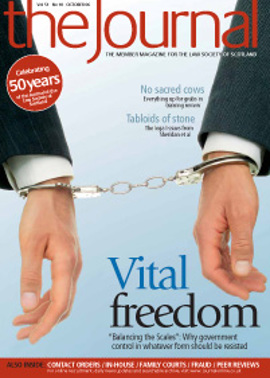End of the peer show

It is already three years since peer review for firms registered to provide civil legal aid was introduced to coincide with the new legal aid block fee system. With the first round of reviews due to complete this month, those in charge are happy with the way they are working.
The quality assurance testing that the reviews embody requires each of the 693 firms currently registered to undergo an audit of random files in the course of a three-year period, by one of a team of experienced civil legal aid practitioners appointed as reviewers. The Quality Assurance Committee reviews the audit reports and decides whether a firm should pass at that stage or be continued to a further review.
“The system put in place has been rigorous, but very consistent”, claims Bobby Frazer, partner in the Edinburgh office of Drummond Miller and convener of the QA Committee. “The findings demonstrate that across Scotland the quality of advice provided to the public has to be said to be good. There will always be some problems, but the system is there to ensure that everyone is working to a certain standard.”
Impressive figures
Frazer supports his upbeat message with the statistics compiled by his committee – a body with three representatives each from the profession, the Scottish Legal Aid Board and QA-qualified non-lawyers. Of around 630 firms through the process by mid-September, only 87 required to have their cases continued for further review. In only 35 cases did the reviewers have to carry out a wider examination of files than the random five initially selected (by SLAB, from certificates granted), and report again to the committee. And only 15 firms have been put to “final review” – under which, if the committee is still not satisfied at the previous stage, the firm attempts to address the problems identified and then requests a further review within a 6-12 month period.
“The committee has by and large been very impressed with the standard”, Frazer adds, “and some firms are exemplary.”
Confidentiality issues
While some firms have raised concerns over client confidentiality, Frazer points out that the client declaration in the civil legal aid application form includes a consent to papers being examined for this purpose. The Society also took counsel’s advice on the competency of the scheme, and firms signed up to it as part of the registration process. File reviewers are of course strictly bound not to disclose what they learn; and any particularly sensitive matter such as medical records can be kept aside if not essential to the review.
All over again
The QA Committee has had its work cut out. Reviewers had to be appointed, 17 initially but now 23, and given a rigorous training to ensure so far as possible a consistent application of standards. Once the system was up and running – which took the best part of a year – reviews had to be carried out within the remainder of the three year cycle, which has meant looking at 40 or 50 firms a month. Of course the review rota begins all over again in November, but Frazer is optimistic that it will prove easier for all concerned the second time round.
“The process has made firms and practitioners much more aware of the rules and guidelines, as well as showing what needs to be tightened up”, he explains. “Firms have been making changes in working practices, to eliminate any problems and the whole process is to try and encourage and develop better working practice across the board.”
Where mistakes happen
Of the issues that can lead to a firm not passing its review first time, the same things tend to come up fairly regularly and solicitors may be prejudicing their own position as well as their clients’. Examples include:
- Clawback: a failing that occurs both in civil legal aid, and advice and assistance, is not explaining when the Board is likely to recoup its costs out of money paid to a successful client. The now-compulsory letter of engagement should cover this, but instances are still coming to light of no letter being sent or of a persistent failure to explain clawback regulations properly.
- Part private funding: with advice and assistance, once it is granted a solicitor can carry out work up to the authorised limit - even if a client’s financial circumstances improve – but the client must be advised when that point is reached, and asked if they wish the solicitor to continue to act. It is not appropriate for work to continue and the client to be unexpectedly billed when such funding ceases.
- High contributions: If a client’s legal aid contribution is assessed at more than the solicitor’s estimate of the likely expense, sometimes solicitors will advise clients not to take up the offer – without considering the possibility of informing SLAB, who may be prepared to revise any such offer thereby affording the client further protection against a possible future finding of expenses. The client should always be given that choice.
- Applying in time: solicitors don’t always request increases in authorised expenditure (for A&A) timeously, or make proper use initially of the special urgency provisions in civil applications, thereby exposing themselves or the client to potential loss.
- Time bar to accounts: Solicitors can overlook the time limits for submitting accounts (12 months for A&A; six for civil legal aid). Whilst these can be relaxed (on cause shown), this is not guaranteed.
- Copy applications: A failure to keep a copy of the Civ/Sol application form on file means an inability to be able to report any change in the prospects of success or reasonableness of granting legal aid, as well as creating difficulty for the reviewer in assessing the file.
- Inactivity: all firms should have a file review system in place, if only to make sure they get paid!
- Handwritten file notes: be legible! It doesn’t just make the reviewer’s job easier; it helps avoid mistakes if anyone else has to deal with the file for any reason.
- More detailed notes on the Quality Assurance Scheme will appear in The Recorder; and SLAB will be running seminars on this and the fee charging system in the near future.
In this issue
- TUPE passes the buck (1)
- Survival of the fittest? A reply
- Channels of communication
- Time to discard the PIPs
- Speaking in the public interest
- Education's Big Bang
- If you can't say anything nice...
- Lesbian families, parenthood and contact
- Keep it in the family
- End of the peer show
- New chambers challenges Faculty Services
- Cash without borders
- Fraud - the threat from within
- Note it down - or lose out
- Balancing privacy and data sharing
- Provoking argument
- To amend or not to amend?
- Purchases under test
- TUPE passes the buck
- Scottish Solicitors' Discipline Tribunal
- Website reviews
- Book reviews
- Law or regulation? The blurring gets more blurred
- Registers success with direct debit






